
Trying to calculate your pool deck cost? Our guide walks you through both inground and above-ground pool deck cost factors, such as material, location, and labor rates.
Breezy spaces built for slow moments


Per square foot, porches cost $40 to $120 while verandas cost $60 to $150.
Verandas extend outdoor living space that's suitable for entertaining and decorating with large furniture.
Porches, built in the front or back of a home, provide a welcoming entryway for guests.
Verandas are more expensive to build than porches but have a better ROI.
There's no denying the charm of a covered outdoor space. Verandas and porches are architectural features that do more than add curb appeal. They create a welcoming area to relax, entertain, or enjoy the outdoors with a bit of shade and shelter. Here's how to decide the best outdoor oasis for your home: veranda versus porch.
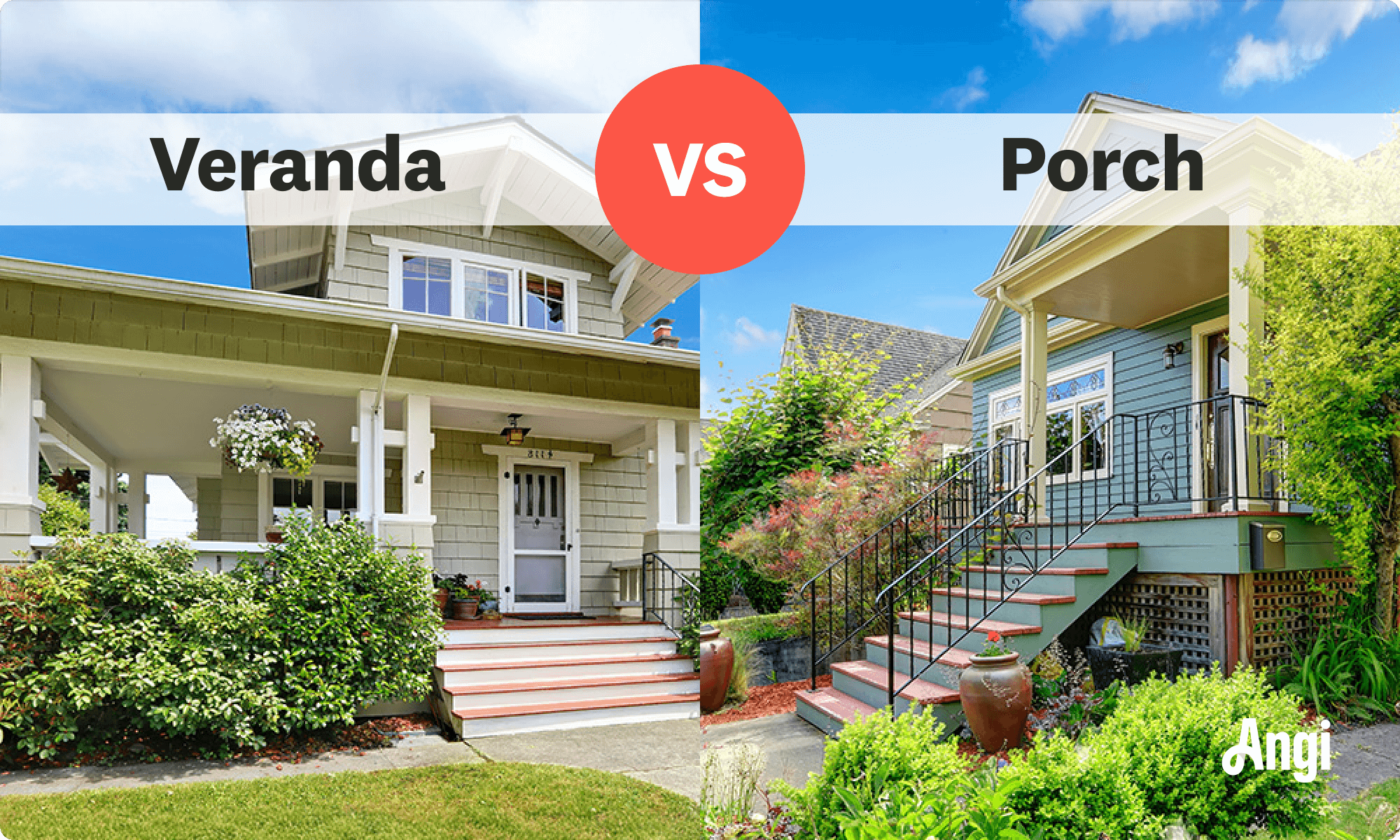
Veranda and porch are terms sometimes used interchangeably, but there are a few differences between these relaxing outdoor spaces. A porch is a covered entrance attached to the front or back of a house and may be open or enclosed. A veranda is larger than a porch and wraps around one or more sides of the home. Always roofed, verandas feel more like an extended outdoor living space. All verandas are porches, but not all porches are considered verandas.

A veranda is a roofed, open-air structure that’s attached to the exterior of a house and wraps around one or more sides. The deep structure creates a shaded space that connects the indoors with the outdoors and fits plenty of furniture. Verandas are common in warm climates and offer a breezy, sheltered area for relaxing, entertaining, or enjoying the view.
| Pros | Cons |
|---|---|
| Extends living space | High cost to build |
| Seamless indoor-outdoor flow | Requires more maintenance |
| Weather protection | Requires permits to build |
| Improve curb appeal | Privacy concerns |
Best for:
Entertaining guests outdoors
Creating seamless indoor-outdoor living
Homes in warm climates
Verandas offer a stylish and functional way to extend your living space outdoors. A veranda provides a comfortable, shaded area that bridges the gap between your indoor and outdoor environments to host friends for dinner, enjoy a quiet morning coffee, or watch the sunset. It’s especially beneficial in warmer climates, where you can enjoy fresh air without direct exposure to harsh sun or rain. Plus, with the right furnishings and design touches, a veranda can become a true outdoor retreat that adds day-to-day value to your home.
Beyond comfort, verandas add visual appeal and increase the value of your property. Their presence can elevate the overall look of a home, lending a classic, welcoming feel that enhances curb appeal. From colonial-style homes to modern farmhouses, verandas can be tailored to suit a range of architectural styles. They're not just beautiful. They’re also practical, offering a flexible space that adapts to your needs throughout the year.
Building a veranda, especially one that wraps around a home or features custom materials, can be a significant investment. Maintenance—like cleaning, painting, and repairs—is also a must since the space is exposed to the elements. Depending on your location, a veranda may require permits or compliance with local building codes, which can slow down construction time.
Verandas provide beautiful open space but don’t always offer much privacy—especially if your home is close to neighbors or a busy street. While they offer some protection from the weather, extreme conditions like high winds, snow, or intense heat may still make the space less usable at certain times.
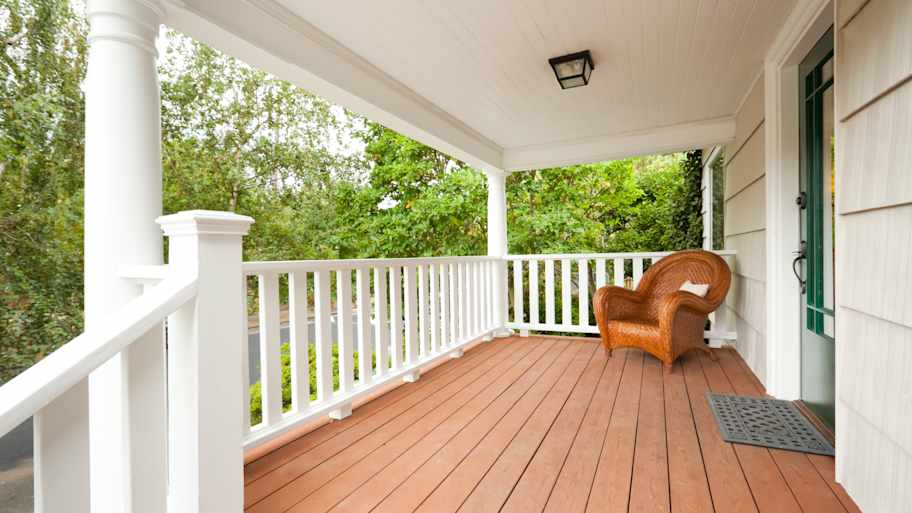
Unlike a porch versus a deck, a porch is a covered structure rather than an open structure attached to the entrance of a home, either at the front or back, and can be open or enclosed depending on the design. It serves as a transitional space between the outdoors and indoors, and features steps, railings, or columns, and provides a welcoming area to greet guests or relax. Porches vary widely in size and style, from small stoops to spacious wraparound versions, and are a common architectural feature in many types of homes.
| Pros | Cons |
|---|---|
| Cozy entryway | Limited size |
| Versatile use | Requires maintenance |
| Enclosure options | Privacy concerns |
| Adds character | Permits required |
Best for:
Homes with limited outdoor space
Creating a welcoming entryway
Seasonal decorating
A porch is a timeless feature that adds warmth and character, creating a welcoming entryway that enhances curb appeal. Even a small porch provides a cozy space to greet guests, drop off packages, or sit with a cup of coffee. Because they come in a variety of styles—from simple stoops to spacious wraparounds—they’re a flexible design element that can match any home.
Another big plus is versatility. A porch can serve multiple functions—whether it's a place to relax, decorate seasonally, or store muddy boots. It can be screened in or enclosed, turning it into three-season rooms or added living space.
Many porches, especially front ones, are too small for lounging or entertaining. They’re more of a pass-through or sitting area than a full-fledged outdoor room. And if the porch is open to the elements, it can be vulnerable to wear and tear over time. Constant exposure to sun, rain, or snow can lead to peeling paint, warped wood, or rusted fixtures, all of which require regular maintenance.
Privacy can also be an issue, especially if your porch faces the street or sits close to neighboring homes. Without screens, fencing, or landscaping, it may feel more exposed than you'd like. For those considering adding or renovating a porch, permits and adherence to local building codes are required.
Porches and verandas can each enhance a home’s appearance, depending on the home's layout and personal aesthetic preference. A porch adds charm and character to the entryway, while a veranda offers a sweeping, elegant look that wraps around the home.
While verandas offer more space for creative layouts and outdoor features, porches are easier to customize and provide a wide range of design options without the need for complex structural planning. Verandas may offer grander design potential, but porches provide more accessible and budget-friendly customization.
Porches hold up better over time simply because they’re smaller and more sheltered by the home’s structure. Verandas, being larger and more exposed, are more vulnerable to weather-related wear and tear, especially in harsh climates.
Porches are more affordable to build and maintain due to their smaller footprint and simpler construction. Verandas can be significantly more expensive, especially if they wrap around the home or use high-end materials. How much a porch costs varies by square foot, but on average costs $40 to $120 per square foot, compared to verandas, which cost $60 to $150 per square foot and come with a larger footprint.
Porches are easier and faster for your local porch pro to install since they involve less square footage, fewer materials, and simpler structural planning. Verandas require more extensive construction and can involve foundation work and a longer timeline.
Repairs on porches are quicker and less costly, given the smaller area and straightforward design. Verandas may require more extensive work due to their size and exposure, especially if structural posts or flooring are damaged.
Because porches are more protected and compact, they’re easier to clean and maintain. Verandas, while beautiful, require more ongoing upkeep—cleaning larger surfaces, repainting, and addressing wear.
A veranda can significantly boost a home’s value, especially in warmer areas where outdoor living is common. Verandas add usable square footage and a luxurious feel that attracts buyers. While porches can also add value, verandas win out on resale impact.
Mayflower was an excellent choice for the complete renovation of my condominium. They knew exactly how to deal with the complexities of the condo building and management to make the project very smooth, easy and done right. From start to finish, everyone was incredibly helpful and their...
Tony was very professional and personable. He explained the damage he saw and reassured me the work to be performed. On the day of the visit he was punctual, courteous and exceeded my expectations while sharing information.
We contracted NY Galaxy General Contracting to complete a recent, entire home renovation, this included bedroom, living room, kitchen and bathrooms. The project was seamless and completed just in time.I highly recommend them as they are extremely professional and truly care about their...
Alex and his crew are great! I contracted them to move my dad and they went above and beyond!
Excellent sales staff and installer. Easy to work with. I appreciated that my current system was able to be activated and used.
We didn't have to put down a deposit, and they did a fantastic job landscaping the front and rear! I appreciate it!
I needed a kitchen and bathroom remodeling and these guys were the best people I could choose. They took my vision and brought it to life! Amazing customer service.
From average costs to expert advice, get all the answers you need to get your job done.

Trying to calculate your pool deck cost? Our guide walks you through both inground and above-ground pool deck cost factors, such as material, location, and labor rates.

Ipe decking costs vary based on size, construction, finish, and whether you hire a professional. Learn more about how to budget for this project.
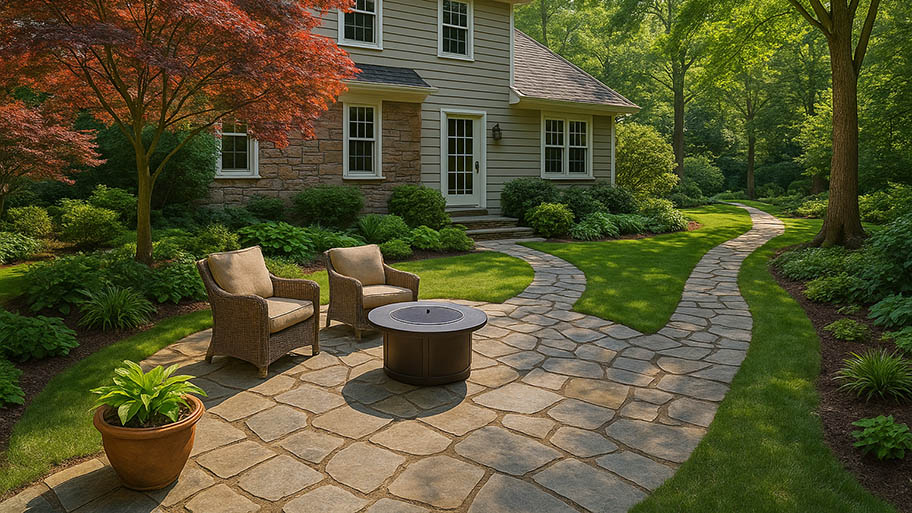
Flagstone patio costs vary by the size, material type, labor, and more. Stay tuned to see how much your flagstone patio could cost.
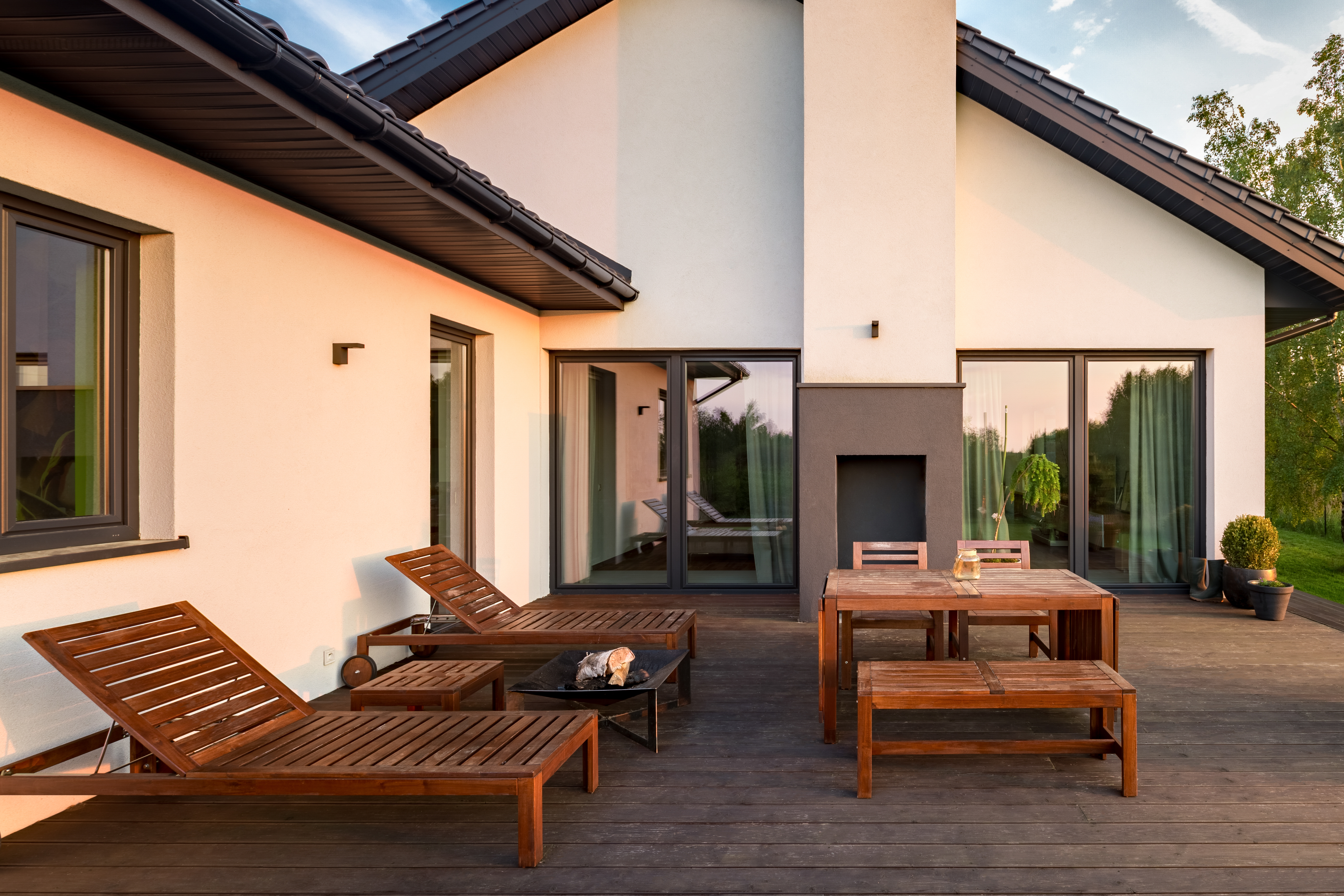
If you are one of many homeowners asking, “Why are my deck boards cupping?” We get to the source of the problem and how to fix it.
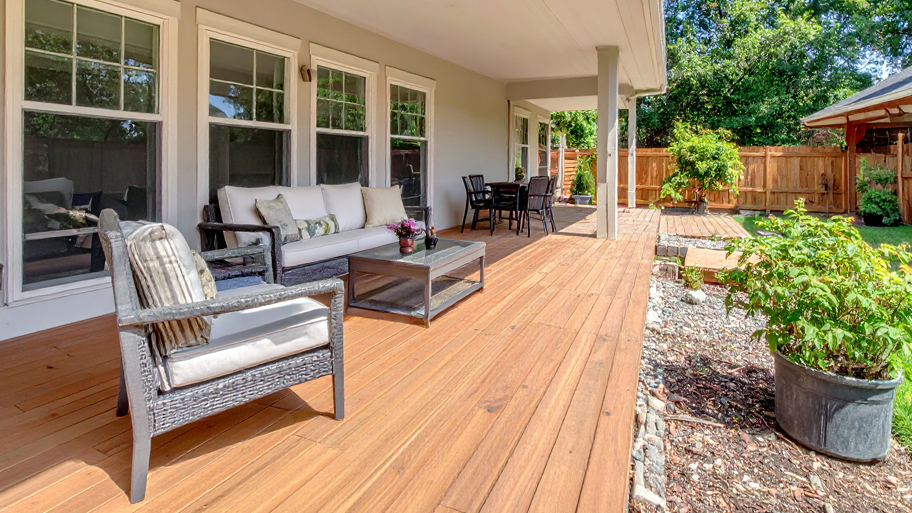
Homeowners are turning to pressure treatment to shield their wood from the elements and pesky insects. Discover how much longer you can make your wood last.
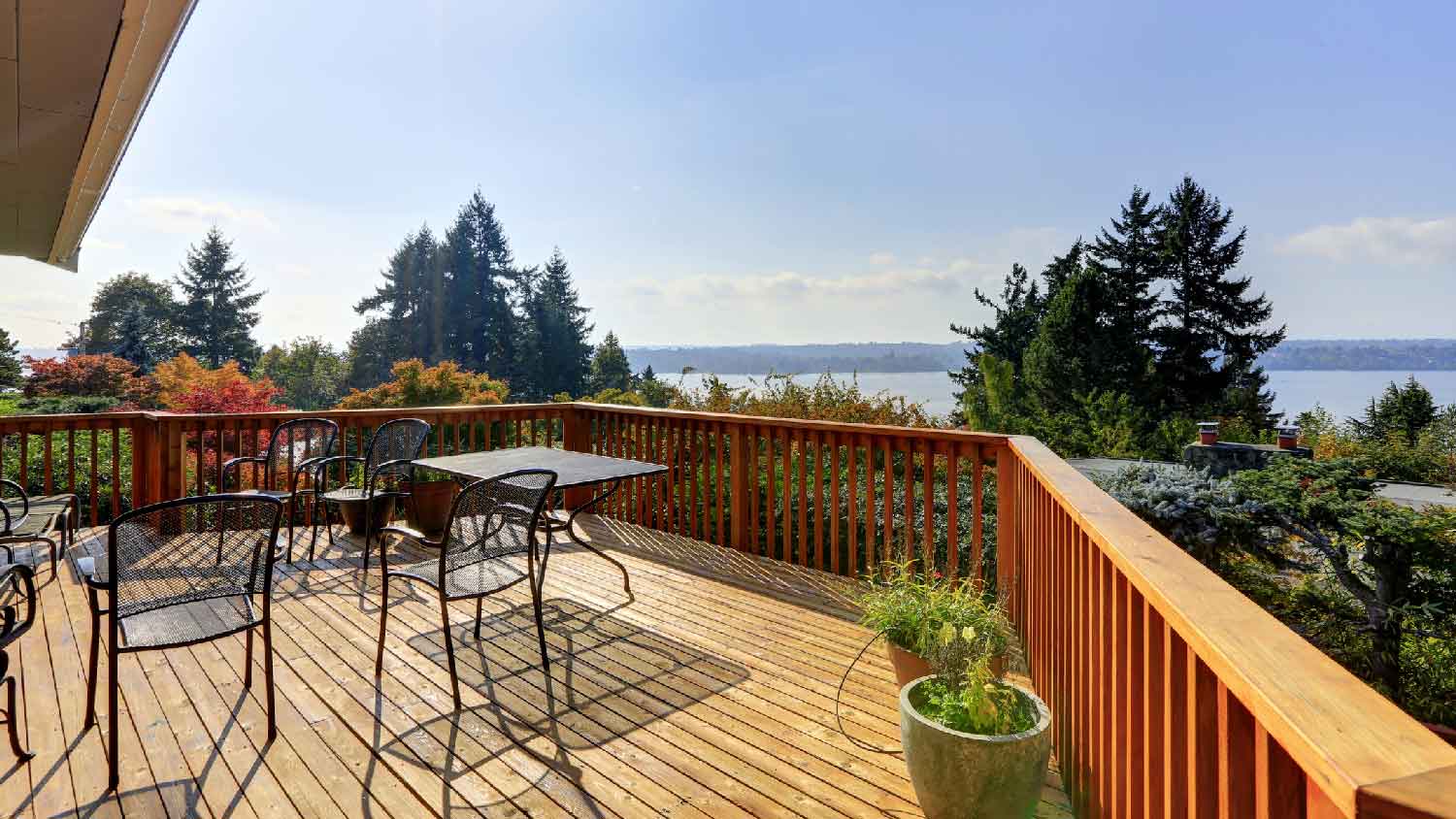
Learn how to replace a deck railing with this step-by-step guide, including required tools, material costs, safety tips, and when to hire a professional.